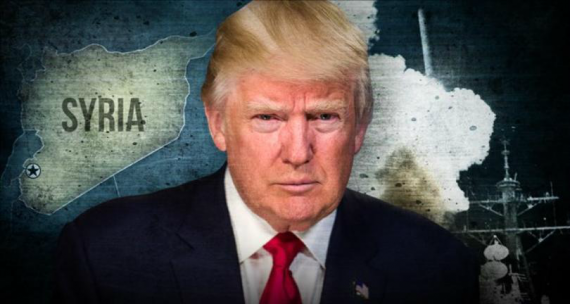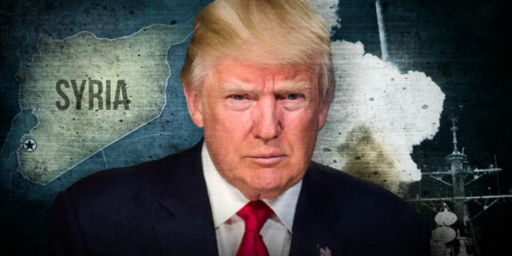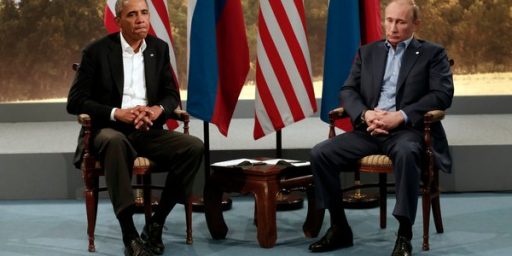There Are No Good Options In Syria, So Maybe We Shouldn’t Do Anything
The United States has several options in Syria. None of them are good and one of them would be disastrous.
In the days since news of the latest chemical weapons attack in Syria become public, it has become apparent from the public comments that President Trump has made that he seems intent on organizing some sort of punitive military response against the regime of Bashar Assad, potentially one more severe than the relatively limited military strikes we saw last year. This seemed to become more certain this morning when it was announced that the White House had canceled the President’s planned trip to South America for a meeting of the Organization of American States, a trip that Vice-President Pence will make instead. As Max Fisher notes in The New York Times, though, it seems quite apparent that the United States has no good options in Syria, and several that seem likely to just make things worse:
Chemical weapons are again suspected to have been used in Syria, apparently by government forces, circumstantial evidence suggests. Again, many Americans, particularly in Washington, have responded with calls to do something. And, again, punitive airstrikes against the Syrian government are the most discussed option.
These debates over Syria are revealing, but not in the way the participants often intend. That Americans so often arrive at the same policy of limited airstrikes tells us a lot about why the Syria problem is so difficult. It also tells us a lot about the foreign policy hangups of the United States.
You can tell there’s something odd about this conversation by the fact that it’s barely changed between the Obama and Trump administrations.
It was one thing, before 2017, to argue that, had then President Barack Obama followed through on his 2013 threat of punitive strikes, this would have deterred Syria from future use of chemical weapons, changed the course of the war, and perhaps even toppled Bashar al-Assad, the Syrian leader.
But last year President Trump carried out punitive strikes of exactly the sort that had been demanded. Little demonstrably changed in Syria. But, oddly, not much changed in the United States either, where the belief in limited strikes remains as firm as ever.
“The utter irrelevance of Trump’s one-off bombing of a Syrian airfield hasn’t made the slightest dent in the myth that Obama bombing Syria in 2013 would have changed everything, has it,” Marc Lynch, a George Washington University professor of Middle East studies, wrote on Twitter.
Indeed, pressure is mounting for another set of such strikes, and it looks as if Mr. Trump may again carry them out.
Fisher goes on to discuss the three options that Trump is likely facing, and explains why each of them is unlikely to work:
Option category #1 could be termed the sort of limited, punitive strikes that Mr. Obama was pressured to execute and that Mr. Trump saw through last year.
Such action is meant to impose a modest cost on Mr. Assad or to send a message that future chemical weapons use will not be tolerated. At the same time, it is meant to avoid any risk of changing the course of the war, which could lead in unanticipated directions — like embroiling the United States in a larger conflict, or collapsing the Syrian government, which could, in turn, spread chaos that would risk millions of lives.
But past efforts at these kind of strikes have failed for two reasons. First, they do not change Mr. Assad’s calculus because, to Mr. Assad, this war is a matter of personal and national survival. If he believes chemical weapons are necessary to his survival, he will abandon them only in the face of some threat to his survival greater than the benefit he thinks they offer him. That requires an existential threat, which the United States is unwilling to impose because of the risks.
Second, Mr. Assad’s Russian and Iranian allies can easily help him absorb the costs imposed by such strikes. If the United States bombs another Syrian runway, Russian contractors can simply pave Mr. Assad a new one. It’s not exactly a game-changer for him.
(…)
Option category #2 might describe the policies that Mr. Obama favored: actions that make the war costlier for Mr. Assad — arming anti-government rebels, for instance — so as to pressure the Syrian leader into complying with American demands.
Mr. Obama supplied rebels with anti-tank TOW missiles, which they used to great effect, pushing back government forces with the weapons they called “Assad tamers.”
The problem with this strategy is that Mr. Assad’s Russian and Iranian allies are able to escalate in turn, matching and exceeding any American bid. The Americans send guns; the Iranians send a combat brigade. The Americans send missiles; the Russians install an artillery unit. Russia and Iran can simply do more, giving them control over what military planners call “the escalation ladder.”
(…)
Option category #3 would be attacks that go beyond what the Russians and Iranians can match, which is likely to mean either a full intervention or strikes that existentially threaten the Syrian government.
These strikes would only be enough to work if they deliberately create one of two risks that the United States has strained to avoid. The first risk is that of collapsing the Syrian government, which would exacerbate Syrian suffering by throwing millions more lives into chaos and most likely prolong the war. The second risk is of a direct military confrontation with Russia, a nuclear-armed power with the ability to escalate hostilities rapidly in the Middle East and Eastern Europe, putting millions of non-Syrians at risk.
“Bottom line: Assad’s actions are abhorrent, but there is no practical military option here unless you are willing to effectively collapse the Syrian state and re-escalate the civil war,” Ms. Ashford wrote.
Mr. Trump, she predicted, would launch another set of punitive strikes that would “change nothing” but win domestic approval.
Of these three, the third option would certainly seem to be the worst. Notwithstanding how inhumane Assad’s use of chemical weapons is, actions that would essentially involve attempting to depose him would most certainly mean that the Russians and Iranians would respond by redoubling their efforts to keep Assad in power. Given the fact that they have far more at stake in the war than the United States, it seems apparent that their efforts would likely succeed, that Assad will remain in power and that the civilian population of Syria will suffer even further as a result of what would likely be an uptick in military activity in a conflict that has largely cooled down in recent months. In this event, the United States and the West would suffer yet another setback in regards to Syria that would further reduce our ability to have any influence at all over a situation that at this point clearly seems to be in the hands of Russia, Iran, and Turkey, none of whom have any interest in seeing Assad out of power any time soon.
The United States would arguably be in a worse position if we went all-in with regard to the Syrian civil war and somehow managed to succeed in deposing the Assad regime either entirely, or in a significant enough part of Syria to create areas where his forces no longer have control of the ground. As was the case with regard to a post-Saddam Iraq, the question at that point would be what might come next in a post-Assad Syria. Like Iraq, Syria is divided among a series of ethnic and religious groups that have their own hostilities against each other and which seem likely to start turning against each other in the absence of a strongman in charge maintaining some semblance of order. The difference is that, at least in Iraq, there was some form of a proto-opposition that was able to take power after a number of years, albeit under circumstances that were less than ideal and which helped create conditions that allowed jihadist groups like ISIS to flourish.
In Syria, there isn’t such an opposition and the most likely outcome of the downfall of the Assad regime would be the kind of chaos that would turn the civil war against Assad into a civil war between Muslims, Christians, and the Alawites from which the Assad family and its supporters. That would create exactly the kind of chaos that we’ve seen in nations such as Afghanistan before September 11th, Libya, and Yemen that has allowed those nations to become breeding grounds and easy hideouts for all forms of jihadist terrorism. Given Syria’s location close to Iraq, Jordan, Lebanon, Saudi Arabia, and Israel, this has the potential to become a more generalized Middle Eastern problem that could last long into the next decade.
As for the first two options, either or both of them would likely serve the purpose of making the United States and the West seem like they’re actually doing something about the Assad regime and its use of chemical weapons, and they’re certainly both better than the third option. As Fisher points out, though, the long-term prospects are that neither one of them will deter Bashar Assad in the least. In the end, the only thing that will restrain Assad is if pressure is put on him by his Iranian and Russian sponsors and, given the fact that they are unlikely to abandon him any time soon, any action we take will only have a limited punitive impact at best. Given the price we’d likely pay by getting any further involved in a conflict we clearly ought to stay out of, that seems to be a good thing.
Ideally speaking, I would argue that the best option for the United States would be to do nothing, but that doesn’t seem to be likely. President Trump already set a precedent by virtue of his actions a year ago and failing to respond to yet another highly publicized attack on civilians would damage American credibility around the world. At the same time, though, we ought to make clear that we’re not going to save Syria from itself. Both because it isn’t in our interest to get more deeply involved in the war, and because, to put it bluntly, we can’t do it.







From quoted article #1:
I don’t think that anyone was demanding that we bomb an airfield so ineffectively that it was repaired and operational again within about a day.
That was an amazingly weak response, and even that weak response caused Assad to not use chemical weapons for about a year. He has presumably stocked up on gravel and asphalt to repair a runway in the meantime.
If we are going to respond, we shouldn’t whiff it — make the strike hurt. My inclination would be to go after Assad’s property, or the government buildings where decisions on how to carry out the war are made. We shouldn’t be targeting Assad, and it would be best not to hit any Russian consultants, so we may have to actually give warning, but it makes the people who make the decisions feel the consequences.
trump’s most pressing need is to get the Cohen story off the news cycle. His response in Syria will be tailored to do just that.
kevin drum this morning:
continued this afternoon:
Supposedly Trump has managed to con Theresa May and Macron into supporting whatever Syria-strike he gets into.
Whether this means that the U.K. and France are willing to do anything more than wag their fingers is beyond me. Personally, I think they’ll try sanctions. (I do expect a lot of internal pushback if either the U.K. or France actually decide to go over and bomb something.)
This is like trying to walk through a muddy field and not getting in the mud.
Where would we start? What would out goals be? How about the exit strategy?
Too many thorns.
Not the first time. Think about Hungary, Berlin, Czechoslavakia, Poland, and other areas. We had to sit those out.
@teve tory: You quote Kevin Drum:
Saddam Hussein was hobbled and contained, without destabilizing the region.
Nope, Gulf War I was a success, and without Gulf War II, Iraq might be a less worse place now.
Gulf War II was not an inevitable consequence of Gulf War I, it was it’s own mostly unrelated mistake that should never have happened. Gulf War I ended with an unsatisfying victory, when we left Saddam Hussein in power. Gulf War II demonstrated what a good idea that was, in retrospect.
@teve tory: And again…
Libya wasn’t going to go well, whether we got involved or not. In terms of the regional stability, all we did was escalate things by a few weeks or months.
We should have stayed out because we had made an agreement with Gaddafi when he gave up his nuclear weapons program, and we undermined our credibility with Iran, North Korea, and any other country that wants a nuclear deterrent.
(Ideally, we would have found Gaddafi a lovely home in the Philippines, or something like that, where he could retire in safety and become a poster-boy for nuclear disarmament being the pathway to security for dictators world wide)
@teve tory: And one more:
Our mission here didn’t make things noticeably worse, and our many naval missions have kept the trade routes mostly open. A small net positive.
The major mistake here is that we didn’t learn any lessons from it — we kind of suck a nation-building and have no idea what we are doing. It was a lesson that could only be learned the hard way, and which we didn’t bother learning.
1) What is the evidence Syrian forces used chemical weapons?
2) How do they gain from doing so?
3) Who does gain, and gain the most, from using chemical weapons in this manner?
Well…President Dennison sent some mean tweets this morning. So it’s all good now.
As far as I am concerned every single pundit who observed something along the lines of “Trump became President today” after the last bombing will have blood on their hands today. We and they knew that Trump plays to ratings and positive feedback like the D-list TV start he was.
Apparently Spineless-Paul Ryan, after giving himself a huge tax cut exploding the deficit and exacerbating economic inequality, is quitting…not going to seek re-election.
None of that changes the overall thesis that when we intervene in the middle east we almost never improve things.
I went into the military in 1994, right out of high school, and immediately after Somalia, and Nobody in the service was thinking of Somalia as a small net positive.
@Tyrell: For some reason, I’m hard pressed to consider the Berlin Airlift “sitting one out.,” but I will defer to your great history teacher from middle school if he told you that’s what it was.